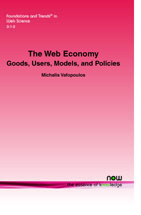The Web Economy: Goods, Users, Models, and Policies
By Michalis Vafopoulos, Aristotle University of Thessaloniki, Greece, vaf@aegean.gr
Abstract
The web has evolved from a piece of software code into an interdependent techno-social system of multi-purpose functionalities. From an interlinked bulletin board with low levels of interaction, a system of multiple interlocking contexts has developed which is now responsible for a substantial share of our financial transactions. Users not only post and link digital content, but also communicate, work, advertise, and exchange information. Multi-fold social and economic interactions result in a dynamic compound of moral values and code. Web Science constitutes a systematic effort to investigate the salient features and implications of this compound by studying the web as a self-standing techno-social artifact. The economic aspects of the web are fundamental but still unexplored in this agenda. The scope of this survey article is twofold: (a) to analyze how the web economy differs from traditional settings and what the implications of these differences are and (b) to formalize a minimal common understanding on the subject of incentives and mechanisms in the web economy. Accordingly, the concept of web goods, a classification of web users and the main functions of the web economy are introduced. This effort is not, by any means, a thorough review of the economic literature related to the web. The focus is on the web as a standalone economic artifact with its own functionality and processes. Our approach is to study goods, users, models, and policies within the web perspective, hopefully contributing to the initiation of Web Economics as a field which investigates the economic motives and implications of the web. In particular, we look at how we can achieve the right balance between open access to online information while also providing proper incentives, producing content, and developing network infrastructure. Moreover, we examine how we can accelerate development by facilitating life-critical functions, transparency, and participation.
The Web Economy
The Web Economy: Goods, Users, Models, and Policies examines how the web economy differs from traditional economic settings and what implications these differences have. It goes on to formalize a minimal common understanding of incentives and mechanisms in the web economy. Accordingly, it introduces the concept of web goods, a classification of web users, and the main functions of the web economy. The WebEeconomy: Goods, Users, Models, and Policies is not a comprehensive review of the economic literature related to the web. The focus is on the web as a standalone economic artifact with its own functionality and processes. It studies goods, users, models, and policies within the web domain, and advances Web Economics as a field that studies economic motives and implications within the web. In particular, it explores how we can balance open access to online information while also providing suitable incentives, producing content, and developing network infrastructure. The Web Economy: Goods, Users, Models, and Policies will be of interest to anyone with an interest in the science of the web generally and particularly in the emerging landscape of the web ecosystem.
